Organisational Behaviour Report: Influence, Motivation, Teams
VerifiedAdded on 2020/10/23
|14
|4385
|413
Report
AI Summary
This report provides a comprehensive analysis of organisational behaviour, focusing on the 2M Group Limited company. It explores the influence of organisational culture, politics, and power dynamics on employee behaviour, highlighting both positive and negative impacts. The report evaluates various motivational theories, including Maslow's Hierarchy of Needs, Herzberg's Two-Factor Theory, Skinner's Reinforcement Theory, and Vroom's Expectancy Theory, offering insights into how to motivate individuals and teams. Furthermore, it delves into the characteristics of effective teams, referencing Belbin's team role theory. The report emphasizes the importance of a positive work environment, effective leadership, and understanding the interplay of various factors to enhance productivity and achieve organisational goals. The report concludes by summarizing the key concepts of organizational behaviour and its applications in real-world scenarios.
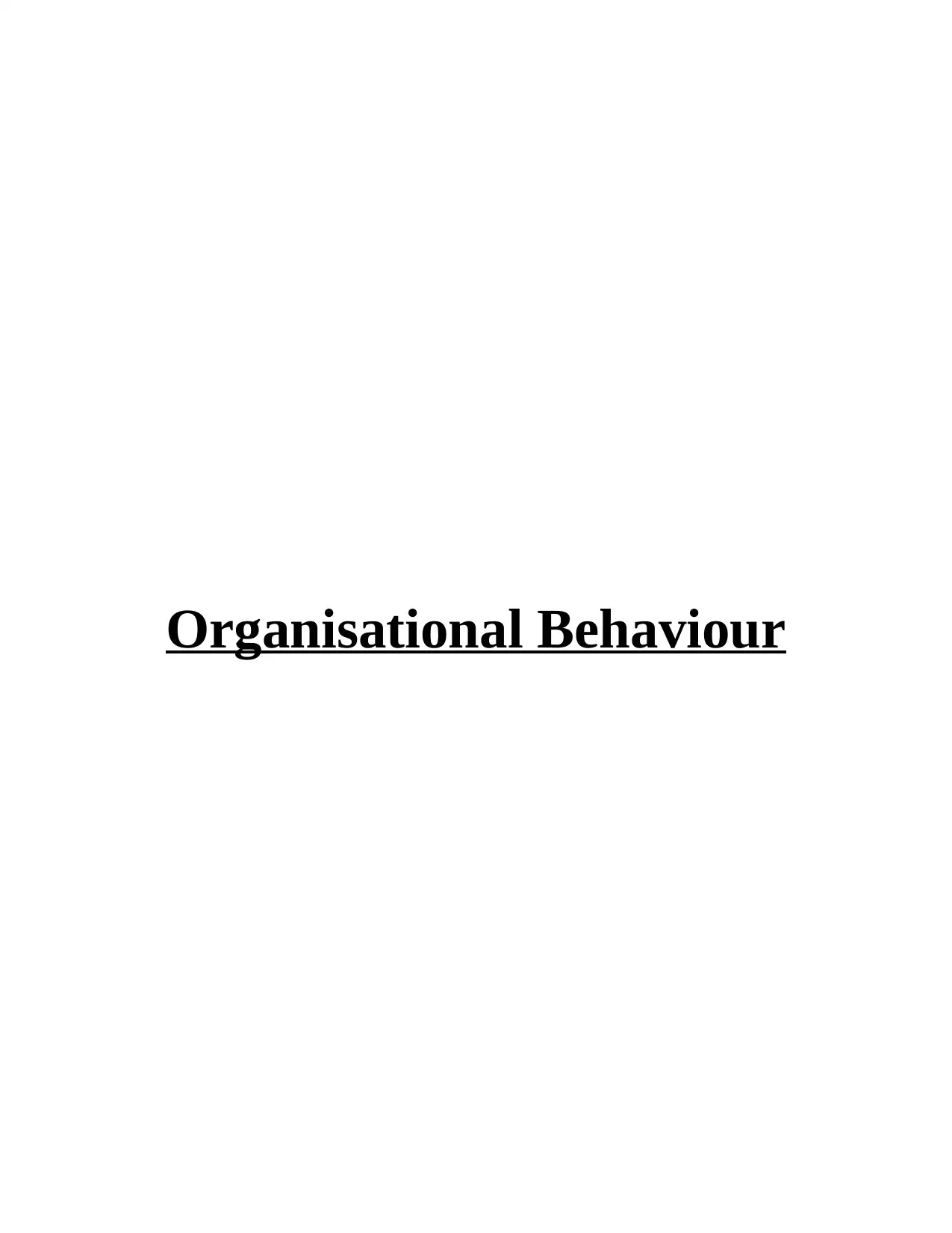
Organisational Behaviour
Paraphrase This Document
Need a fresh take? Get an instant paraphrase of this document with our AI Paraphraser
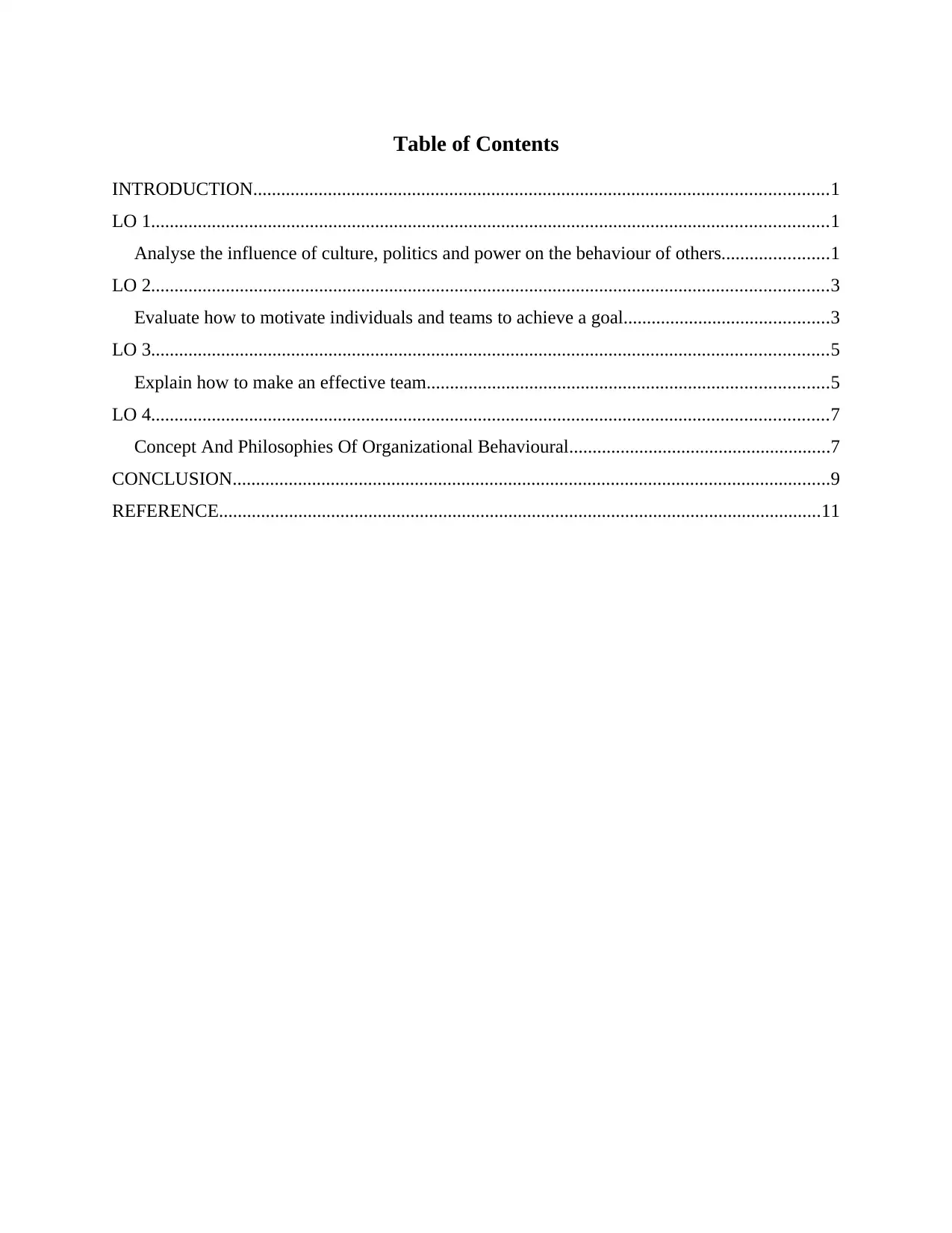
Table of Contents
INTRODUCTION...........................................................................................................................1
LO 1.................................................................................................................................................1
Analyse the influence of culture, politics and power on the behaviour of others.......................1
LO 2.................................................................................................................................................3
Evaluate how to motivate individuals and teams to achieve a goal............................................3
LO 3.................................................................................................................................................5
Explain how to make an effective team......................................................................................5
LO 4.................................................................................................................................................7
Concept And Philosophies Of Organizational Behavioural........................................................7
CONCLUSION................................................................................................................................9
REFERENCE.................................................................................................................................11
INTRODUCTION...........................................................................................................................1
LO 1.................................................................................................................................................1
Analyse the influence of culture, politics and power on the behaviour of others.......................1
LO 2.................................................................................................................................................3
Evaluate how to motivate individuals and teams to achieve a goal............................................3
LO 3.................................................................................................................................................5
Explain how to make an effective team......................................................................................5
LO 4.................................................................................................................................................7
Concept And Philosophies Of Organizational Behavioural........................................................7
CONCLUSION................................................................................................................................9
REFERENCE.................................................................................................................................11
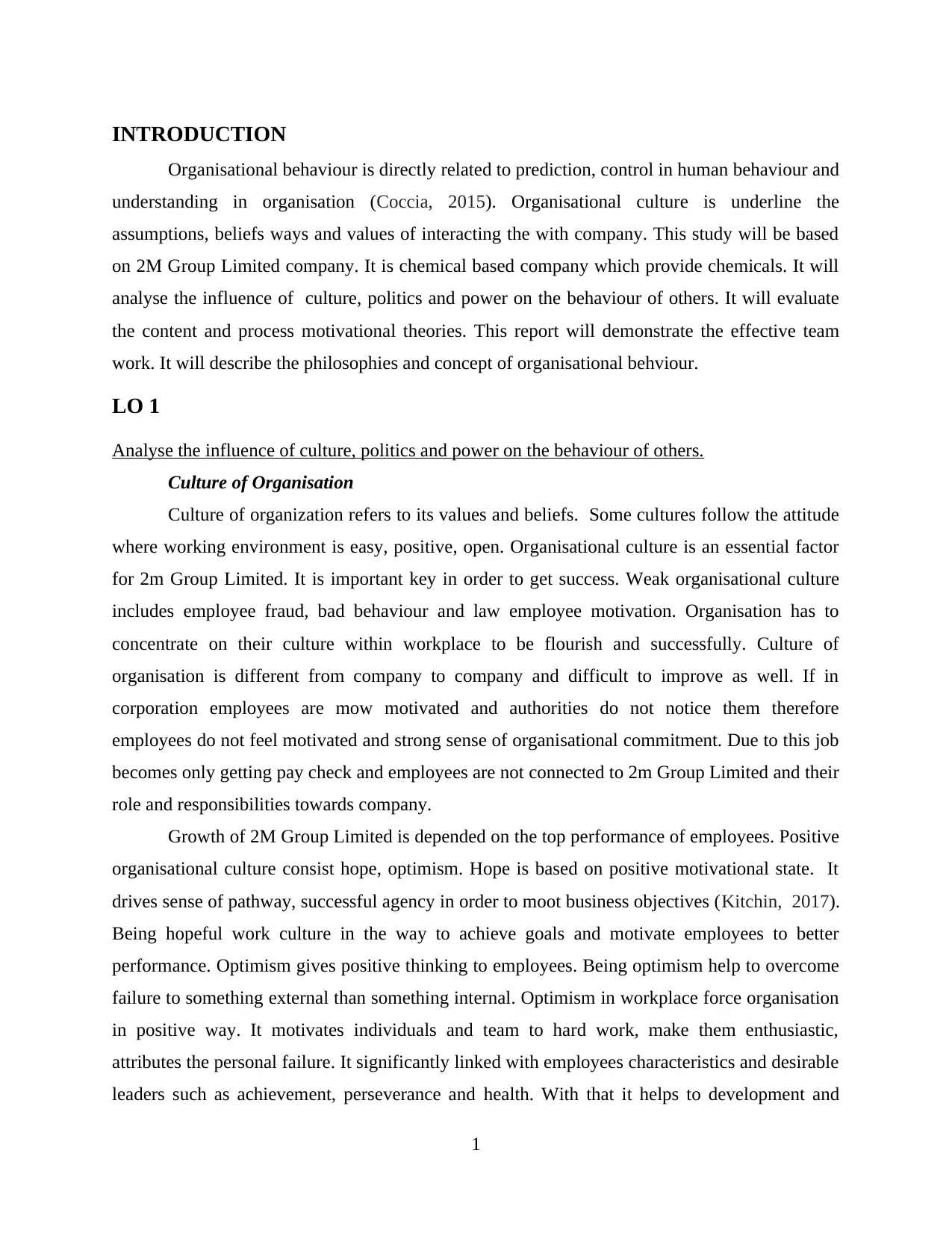
INTRODUCTION
Organisational behaviour is directly related to prediction, control in human behaviour and
understanding in organisation (Coccia, 2015). Organisational culture is underline the
assumptions, beliefs ways and values of interacting the with company. This study will be based
on 2M Group Limited company. It is chemical based company which provide chemicals. It will
analyse the influence of culture, politics and power on the behaviour of others. It will evaluate
the content and process motivational theories. This report will demonstrate the effective team
work. It will describe the philosophies and concept of organisational behviour.
LO 1
Analyse the influence of culture, politics and power on the behaviour of others.
Culture of Organisation
Culture of organization refers to its values and beliefs. Some cultures follow the attitude
where working environment is easy, positive, open. Organisational culture is an essential factor
for 2m Group Limited. It is important key in order to get success. Weak organisational culture
includes employee fraud, bad behaviour and law employee motivation. Organisation has to
concentrate on their culture within workplace to be flourish and successfully. Culture of
organisation is different from company to company and difficult to improve as well. If in
corporation employees are mow motivated and authorities do not notice them therefore
employees do not feel motivated and strong sense of organisational commitment. Due to this job
becomes only getting pay check and employees are not connected to 2m Group Limited and their
role and responsibilities towards company.
Growth of 2M Group Limited is depended on the top performance of employees. Positive
organisational culture consist hope, optimism. Hope is based on positive motivational state. It
drives sense of pathway, successful agency in order to moot business objectives (Kitchin, 2017).
Being hopeful work culture in the way to achieve goals and motivate employees to better
performance. Optimism gives positive thinking to employees. Being optimism help to overcome
failure to something external than something internal. Optimism in workplace force organisation
in positive way. It motivates individuals and team to hard work, make them enthusiastic,
attributes the personal failure. It significantly linked with employees characteristics and desirable
leaders such as achievement, perseverance and health. With that it helps to development and
1
Organisational behaviour is directly related to prediction, control in human behaviour and
understanding in organisation (Coccia, 2015). Organisational culture is underline the
assumptions, beliefs ways and values of interacting the with company. This study will be based
on 2M Group Limited company. It is chemical based company which provide chemicals. It will
analyse the influence of culture, politics and power on the behaviour of others. It will evaluate
the content and process motivational theories. This report will demonstrate the effective team
work. It will describe the philosophies and concept of organisational behviour.
LO 1
Analyse the influence of culture, politics and power on the behaviour of others.
Culture of Organisation
Culture of organization refers to its values and beliefs. Some cultures follow the attitude
where working environment is easy, positive, open. Organisational culture is an essential factor
for 2m Group Limited. It is important key in order to get success. Weak organisational culture
includes employee fraud, bad behaviour and law employee motivation. Organisation has to
concentrate on their culture within workplace to be flourish and successfully. Culture of
organisation is different from company to company and difficult to improve as well. If in
corporation employees are mow motivated and authorities do not notice them therefore
employees do not feel motivated and strong sense of organisational commitment. Due to this job
becomes only getting pay check and employees are not connected to 2m Group Limited and their
role and responsibilities towards company.
Growth of 2M Group Limited is depended on the top performance of employees. Positive
organisational culture consist hope, optimism. Hope is based on positive motivational state. It
drives sense of pathway, successful agency in order to moot business objectives (Kitchin, 2017).
Being hopeful work culture in the way to achieve goals and motivate employees to better
performance. Optimism gives positive thinking to employees. Being optimism help to overcome
failure to something external than something internal. Optimism in workplace force organisation
in positive way. It motivates individuals and team to hard work, make them enthusiastic,
attributes the personal failure. It significantly linked with employees characteristics and desirable
leaders such as achievement, perseverance and health. With that it helps to development and
1
⊘ This is a preview!⊘
Do you want full access?
Subscribe today to unlock all pages.

Trusted by 1+ million students worldwide
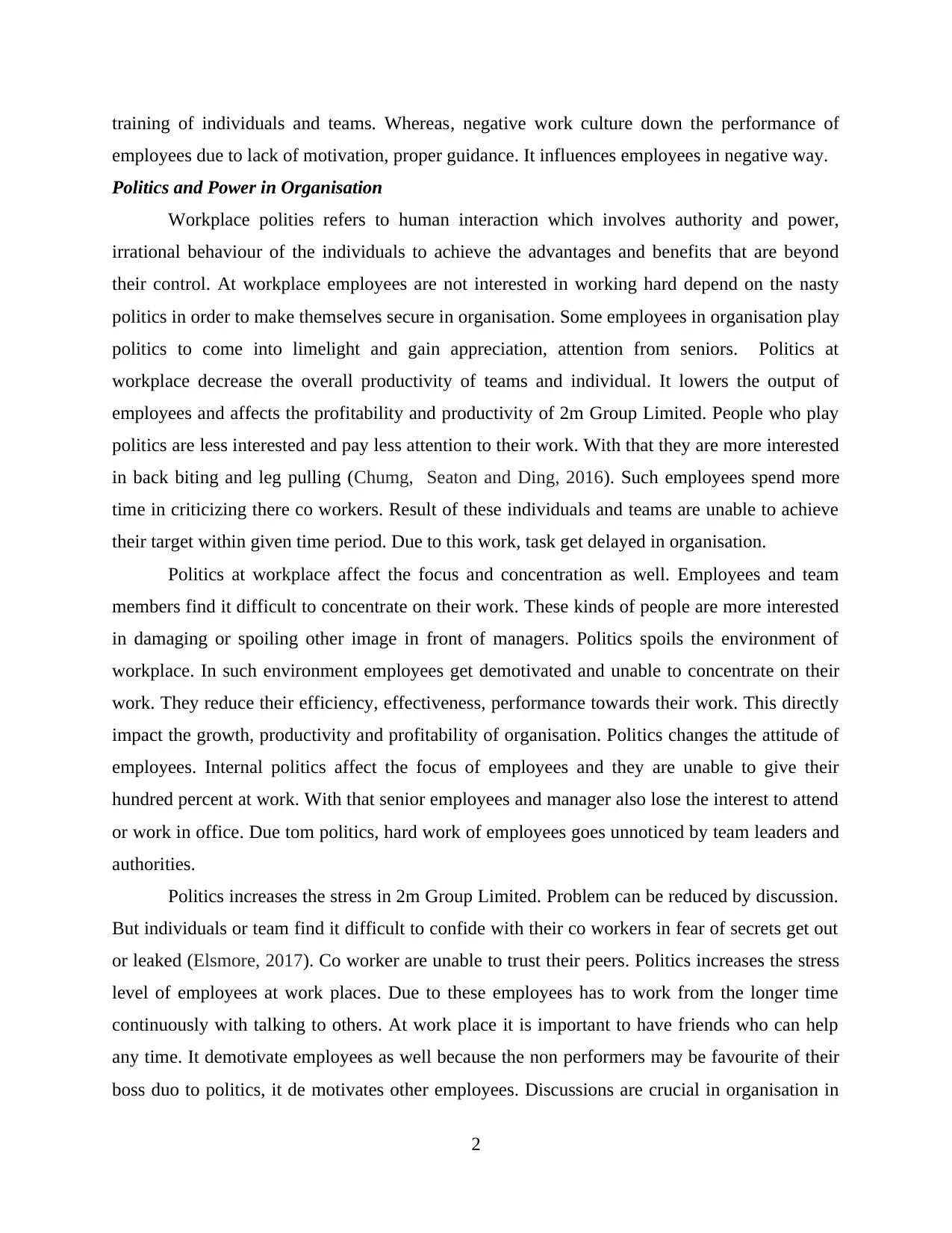
training of individuals and teams. Whereas, negative work culture down the performance of
employees due to lack of motivation, proper guidance. It influences employees in negative way.
Politics and Power in Organisation
Workplace polities refers to human interaction which involves authority and power,
irrational behaviour of the individuals to achieve the advantages and benefits that are beyond
their control. At workplace employees are not interested in working hard depend on the nasty
politics in order to make themselves secure in organisation. Some employees in organisation play
politics to come into limelight and gain appreciation, attention from seniors. Politics at
workplace decrease the overall productivity of teams and individual. It lowers the output of
employees and affects the profitability and productivity of 2m Group Limited. People who play
politics are less interested and pay less attention to their work. With that they are more interested
in back biting and leg pulling (Chumg, Seaton and Ding, 2016). Such employees spend more
time in criticizing there co workers. Result of these individuals and teams are unable to achieve
their target within given time period. Due to this work, task get delayed in organisation.
Politics at workplace affect the focus and concentration as well. Employees and team
members find it difficult to concentrate on their work. These kinds of people are more interested
in damaging or spoiling other image in front of managers. Politics spoils the environment of
workplace. In such environment employees get demotivated and unable to concentrate on their
work. They reduce their efficiency, effectiveness, performance towards their work. This directly
impact the growth, productivity and profitability of organisation. Politics changes the attitude of
employees. Internal politics affect the focus of employees and they are unable to give their
hundred percent at work. With that senior employees and manager also lose the interest to attend
or work in office. Due tom politics, hard work of employees goes unnoticed by team leaders and
authorities.
Politics increases the stress in 2m Group Limited. Problem can be reduced by discussion.
But individuals or team find it difficult to confide with their co workers in fear of secrets get out
or leaked (Elsmore, 2017). Co worker are unable to trust their peers. Politics increases the stress
level of employees at work places. Due to these employees has to work from the longer time
continuously with talking to others. At work place it is important to have friends who can help
any time. It demotivate employees as well because the non performers may be favourite of their
boss duo to politics, it de motivates other employees. Discussions are crucial in organisation in
2
employees due to lack of motivation, proper guidance. It influences employees in negative way.
Politics and Power in Organisation
Workplace polities refers to human interaction which involves authority and power,
irrational behaviour of the individuals to achieve the advantages and benefits that are beyond
their control. At workplace employees are not interested in working hard depend on the nasty
politics in order to make themselves secure in organisation. Some employees in organisation play
politics to come into limelight and gain appreciation, attention from seniors. Politics at
workplace decrease the overall productivity of teams and individual. It lowers the output of
employees and affects the profitability and productivity of 2m Group Limited. People who play
politics are less interested and pay less attention to their work. With that they are more interested
in back biting and leg pulling (Chumg, Seaton and Ding, 2016). Such employees spend more
time in criticizing there co workers. Result of these individuals and teams are unable to achieve
their target within given time period. Due to this work, task get delayed in organisation.
Politics at workplace affect the focus and concentration as well. Employees and team
members find it difficult to concentrate on their work. These kinds of people are more interested
in damaging or spoiling other image in front of managers. Politics spoils the environment of
workplace. In such environment employees get demotivated and unable to concentrate on their
work. They reduce their efficiency, effectiveness, performance towards their work. This directly
impact the growth, productivity and profitability of organisation. Politics changes the attitude of
employees. Internal politics affect the focus of employees and they are unable to give their
hundred percent at work. With that senior employees and manager also lose the interest to attend
or work in office. Due tom politics, hard work of employees goes unnoticed by team leaders and
authorities.
Politics increases the stress in 2m Group Limited. Problem can be reduced by discussion.
But individuals or team find it difficult to confide with their co workers in fear of secrets get out
or leaked (Elsmore, 2017). Co worker are unable to trust their peers. Politics increases the stress
level of employees at work places. Due to these employees has to work from the longer time
continuously with talking to others. At work place it is important to have friends who can help
any time. It demotivate employees as well because the non performers may be favourite of their
boss duo to politics, it de motivates other employees. Discussions are crucial in organisation in
2
Paraphrase This Document
Need a fresh take? Get an instant paraphrase of this document with our AI Paraphraser
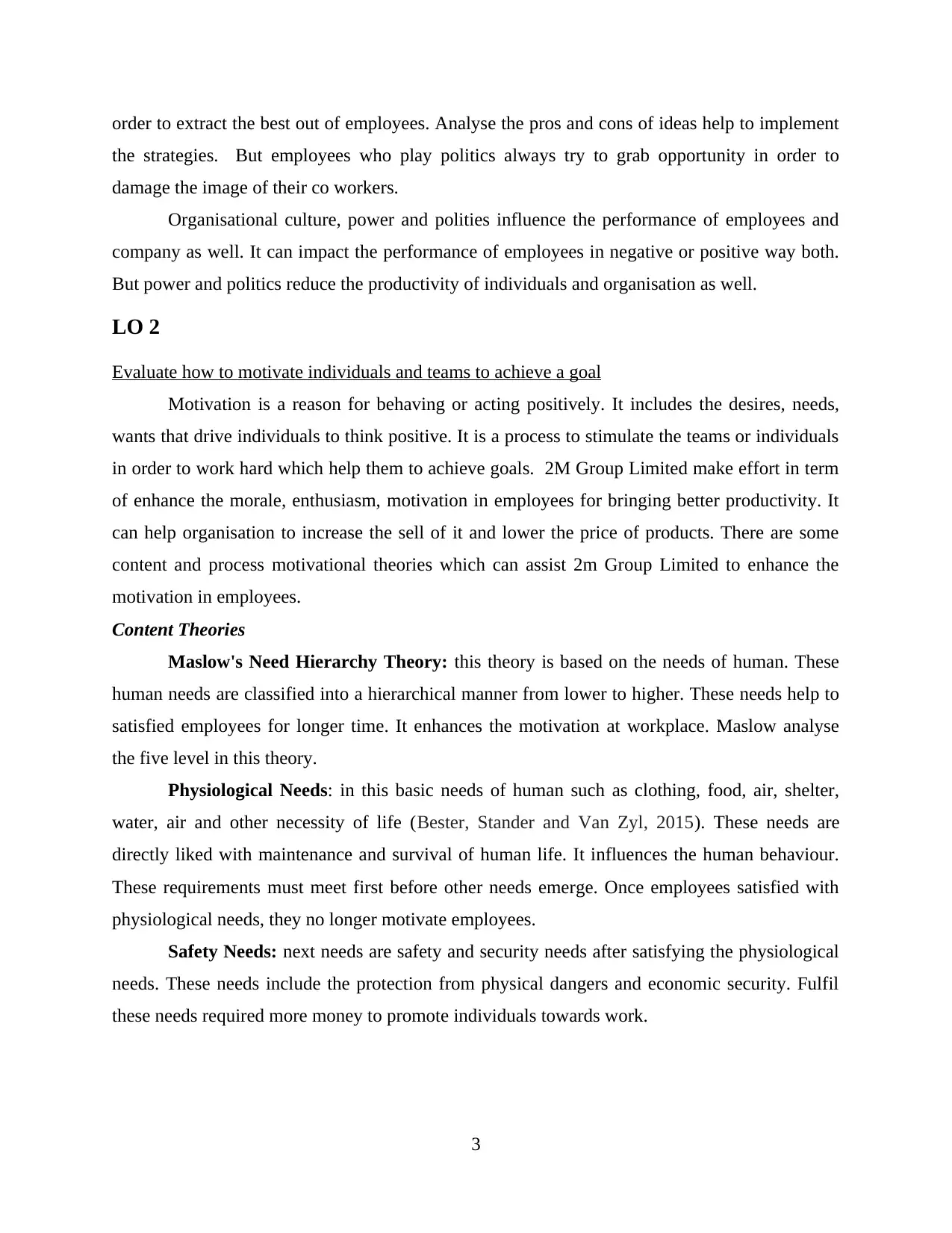
order to extract the best out of employees. Analyse the pros and cons of ideas help to implement
the strategies. But employees who play politics always try to grab opportunity in order to
damage the image of their co workers.
Organisational culture, power and polities influence the performance of employees and
company as well. It can impact the performance of employees in negative or positive way both.
But power and politics reduce the productivity of individuals and organisation as well.
LO 2
Evaluate how to motivate individuals and teams to achieve a goal
Motivation is a reason for behaving or acting positively. It includes the desires, needs,
wants that drive individuals to think positive. It is a process to stimulate the teams or individuals
in order to work hard which help them to achieve goals. 2M Group Limited make effort in term
of enhance the morale, enthusiasm, motivation in employees for bringing better productivity. It
can help organisation to increase the sell of it and lower the price of products. There are some
content and process motivational theories which can assist 2m Group Limited to enhance the
motivation in employees.
Content Theories
Maslow's Need Hierarchy Theory: this theory is based on the needs of human. These
human needs are classified into a hierarchical manner from lower to higher. These needs help to
satisfied employees for longer time. It enhances the motivation at workplace. Maslow analyse
the five level in this theory.
Physiological Needs: in this basic needs of human such as clothing, food, air, shelter,
water, air and other necessity of life (Bester, Stander and Van Zyl, 2015). These needs are
directly liked with maintenance and survival of human life. It influences the human behaviour.
These requirements must meet first before other needs emerge. Once employees satisfied with
physiological needs, they no longer motivate employees.
Safety Needs: next needs are safety and security needs after satisfying the physiological
needs. These needs include the protection from physical dangers and economic security. Fulfil
these needs required more money to promote individuals towards work.
3
the strategies. But employees who play politics always try to grab opportunity in order to
damage the image of their co workers.
Organisational culture, power and polities influence the performance of employees and
company as well. It can impact the performance of employees in negative or positive way both.
But power and politics reduce the productivity of individuals and organisation as well.
LO 2
Evaluate how to motivate individuals and teams to achieve a goal
Motivation is a reason for behaving or acting positively. It includes the desires, needs,
wants that drive individuals to think positive. It is a process to stimulate the teams or individuals
in order to work hard which help them to achieve goals. 2M Group Limited make effort in term
of enhance the morale, enthusiasm, motivation in employees for bringing better productivity. It
can help organisation to increase the sell of it and lower the price of products. There are some
content and process motivational theories which can assist 2m Group Limited to enhance the
motivation in employees.
Content Theories
Maslow's Need Hierarchy Theory: this theory is based on the needs of human. These
human needs are classified into a hierarchical manner from lower to higher. These needs help to
satisfied employees for longer time. It enhances the motivation at workplace. Maslow analyse
the five level in this theory.
Physiological Needs: in this basic needs of human such as clothing, food, air, shelter,
water, air and other necessity of life (Bester, Stander and Van Zyl, 2015). These needs are
directly liked with maintenance and survival of human life. It influences the human behaviour.
These requirements must meet first before other needs emerge. Once employees satisfied with
physiological needs, they no longer motivate employees.
Safety Needs: next needs are safety and security needs after satisfying the physiological
needs. These needs include the protection from physical dangers and economic security. Fulfil
these needs required more money to promote individuals towards work.
3
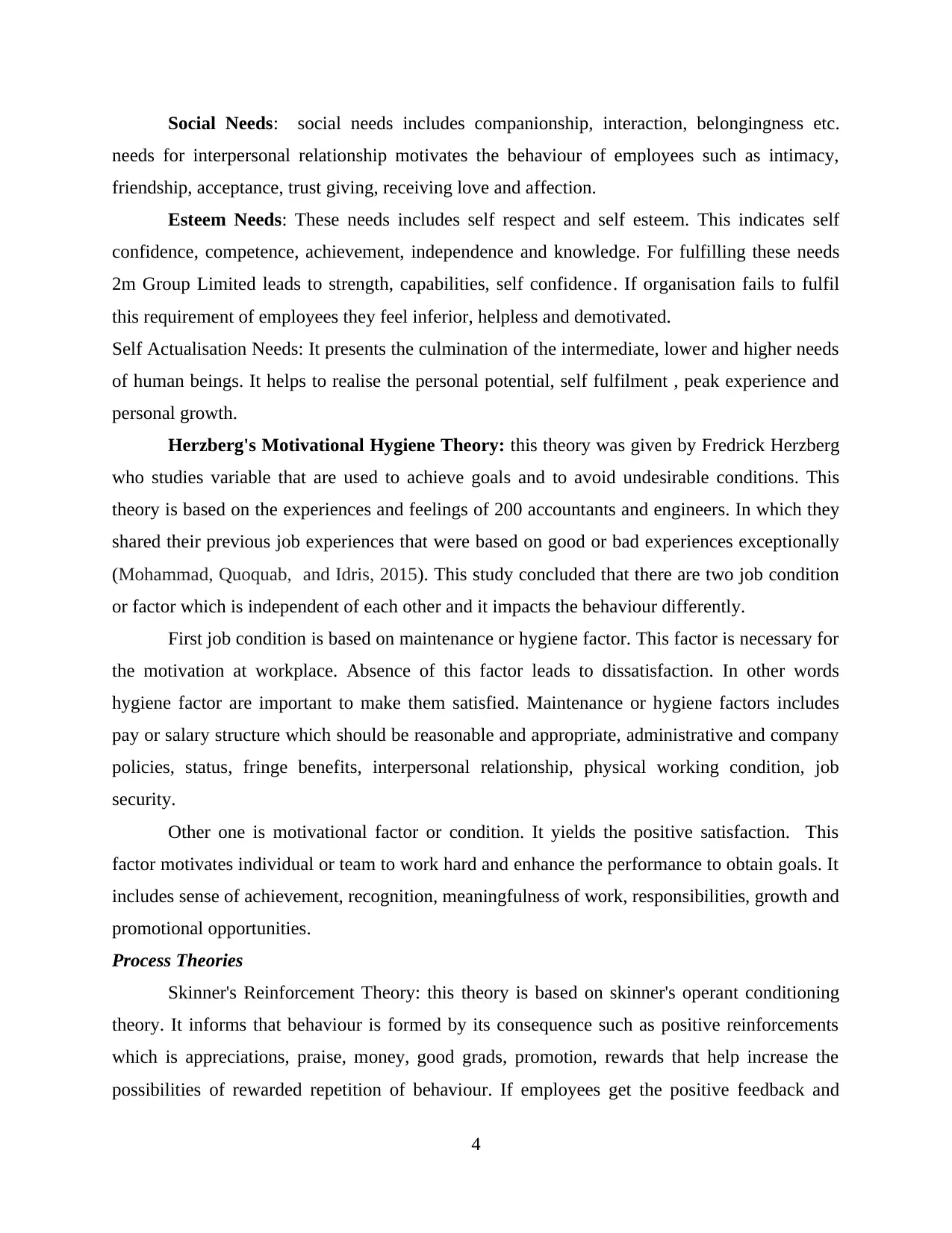
Social Needs: social needs includes companionship, interaction, belongingness etc.
needs for interpersonal relationship motivates the behaviour of employees such as intimacy,
friendship, acceptance, trust giving, receiving love and affection.
Esteem Needs: These needs includes self respect and self esteem. This indicates self
confidence, competence, achievement, independence and knowledge. For fulfilling these needs
2m Group Limited leads to strength, capabilities, self confidence. If organisation fails to fulfil
this requirement of employees they feel inferior, helpless and demotivated.
Self Actualisation Needs: It presents the culmination of the intermediate, lower and higher needs
of human beings. It helps to realise the personal potential, self fulfilment , peak experience and
personal growth.
Herzberg's Motivational Hygiene Theory: this theory was given by Fredrick Herzberg
who studies variable that are used to achieve goals and to avoid undesirable conditions. This
theory is based on the experiences and feelings of 200 accountants and engineers. In which they
shared their previous job experiences that were based on good or bad experiences exceptionally
(Mohammad, Quoquab, and Idris, 2015). This study concluded that there are two job condition
or factor which is independent of each other and it impacts the behaviour differently.
First job condition is based on maintenance or hygiene factor. This factor is necessary for
the motivation at workplace. Absence of this factor leads to dissatisfaction. In other words
hygiene factor are important to make them satisfied. Maintenance or hygiene factors includes
pay or salary structure which should be reasonable and appropriate, administrative and company
policies, status, fringe benefits, interpersonal relationship, physical working condition, job
security.
Other one is motivational factor or condition. It yields the positive satisfaction. This
factor motivates individual or team to work hard and enhance the performance to obtain goals. It
includes sense of achievement, recognition, meaningfulness of work, responsibilities, growth and
promotional opportunities.
Process Theories
Skinner's Reinforcement Theory: this theory is based on skinner's operant conditioning
theory. It informs that behaviour is formed by its consequence such as positive reinforcements
which is appreciations, praise, money, good grads, promotion, rewards that help increase the
possibilities of rewarded repetition of behaviour. If employees get the positive feedback and
4
needs for interpersonal relationship motivates the behaviour of employees such as intimacy,
friendship, acceptance, trust giving, receiving love and affection.
Esteem Needs: These needs includes self respect and self esteem. This indicates self
confidence, competence, achievement, independence and knowledge. For fulfilling these needs
2m Group Limited leads to strength, capabilities, self confidence. If organisation fails to fulfil
this requirement of employees they feel inferior, helpless and demotivated.
Self Actualisation Needs: It presents the culmination of the intermediate, lower and higher needs
of human beings. It helps to realise the personal potential, self fulfilment , peak experience and
personal growth.
Herzberg's Motivational Hygiene Theory: this theory was given by Fredrick Herzberg
who studies variable that are used to achieve goals and to avoid undesirable conditions. This
theory is based on the experiences and feelings of 200 accountants and engineers. In which they
shared their previous job experiences that were based on good or bad experiences exceptionally
(Mohammad, Quoquab, and Idris, 2015). This study concluded that there are two job condition
or factor which is independent of each other and it impacts the behaviour differently.
First job condition is based on maintenance or hygiene factor. This factor is necessary for
the motivation at workplace. Absence of this factor leads to dissatisfaction. In other words
hygiene factor are important to make them satisfied. Maintenance or hygiene factors includes
pay or salary structure which should be reasonable and appropriate, administrative and company
policies, status, fringe benefits, interpersonal relationship, physical working condition, job
security.
Other one is motivational factor or condition. It yields the positive satisfaction. This
factor motivates individual or team to work hard and enhance the performance to obtain goals. It
includes sense of achievement, recognition, meaningfulness of work, responsibilities, growth and
promotional opportunities.
Process Theories
Skinner's Reinforcement Theory: this theory is based on skinner's operant conditioning
theory. It informs that behaviour is formed by its consequence such as positive reinforcements
which is appreciations, praise, money, good grads, promotion, rewards that help increase the
possibilities of rewarded repetition of behaviour. If employees get the positive feedback and
4
⊘ This is a preview!⊘
Do you want full access?
Subscribe today to unlock all pages.

Trusted by 1+ million students worldwide
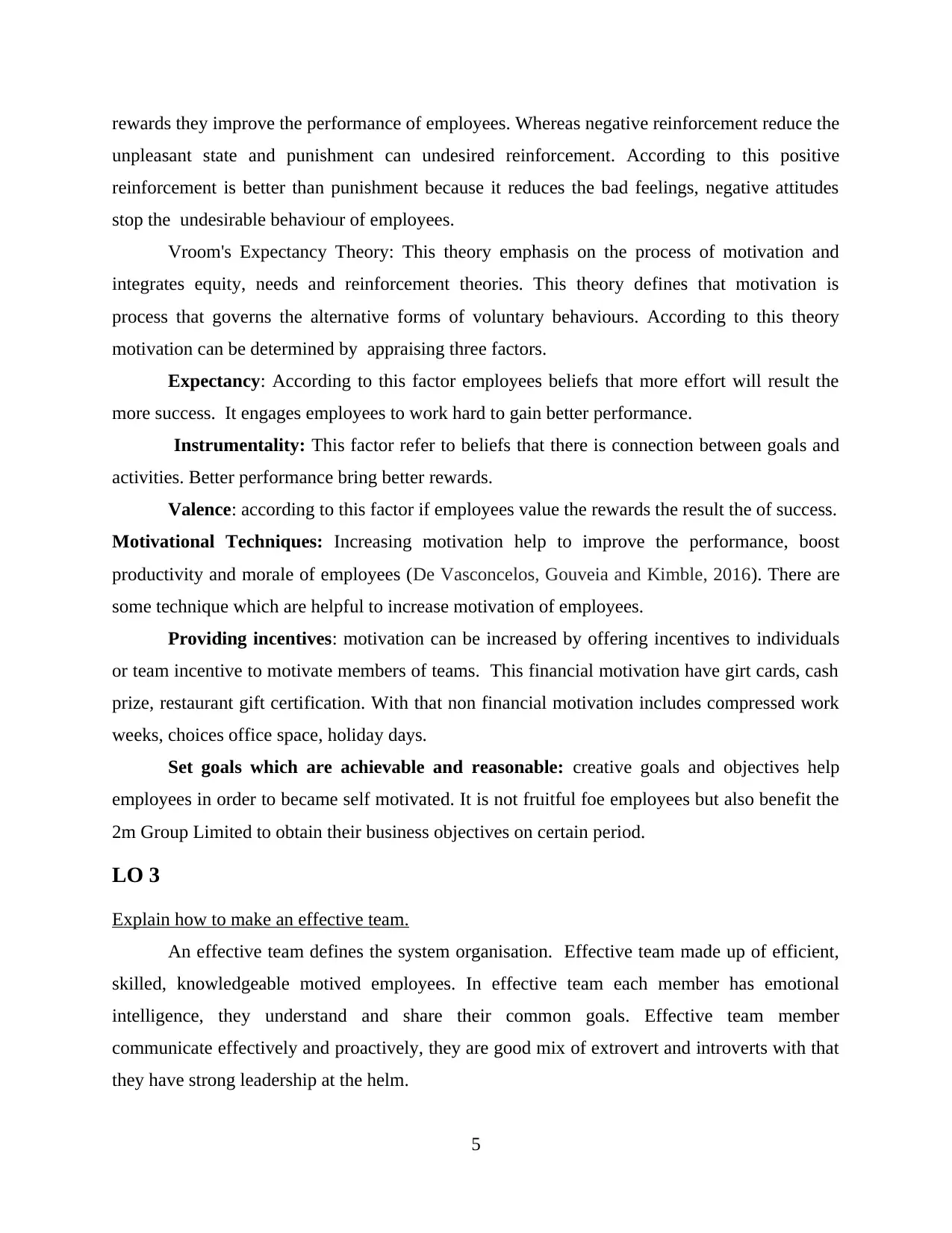
rewards they improve the performance of employees. Whereas negative reinforcement reduce the
unpleasant state and punishment can undesired reinforcement. According to this positive
reinforcement is better than punishment because it reduces the bad feelings, negative attitudes
stop the undesirable behaviour of employees.
Vroom's Expectancy Theory: This theory emphasis on the process of motivation and
integrates equity, needs and reinforcement theories. This theory defines that motivation is
process that governs the alternative forms of voluntary behaviours. According to this theory
motivation can be determined by appraising three factors.
Expectancy: According to this factor employees beliefs that more effort will result the
more success. It engages employees to work hard to gain better performance.
Instrumentality: This factor refer to beliefs that there is connection between goals and
activities. Better performance bring better rewards.
Valence: according to this factor if employees value the rewards the result the of success.
Motivational Techniques: Increasing motivation help to improve the performance, boost
productivity and morale of employees (De Vasconcelos, Gouveia and Kimble, 2016). There are
some technique which are helpful to increase motivation of employees.
Providing incentives: motivation can be increased by offering incentives to individuals
or team incentive to motivate members of teams. This financial motivation have girt cards, cash
prize, restaurant gift certification. With that non financial motivation includes compressed work
weeks, choices office space, holiday days.
Set goals which are achievable and reasonable: creative goals and objectives help
employees in order to became self motivated. It is not fruitful foe employees but also benefit the
2m Group Limited to obtain their business objectives on certain period.
LO 3
Explain how to make an effective team.
An effective team defines the system organisation. Effective team made up of efficient,
skilled, knowledgeable motived employees. In effective team each member has emotional
intelligence, they understand and share their common goals. Effective team member
communicate effectively and proactively, they are good mix of extrovert and introverts with that
they have strong leadership at the helm.
5
unpleasant state and punishment can undesired reinforcement. According to this positive
reinforcement is better than punishment because it reduces the bad feelings, negative attitudes
stop the undesirable behaviour of employees.
Vroom's Expectancy Theory: This theory emphasis on the process of motivation and
integrates equity, needs and reinforcement theories. This theory defines that motivation is
process that governs the alternative forms of voluntary behaviours. According to this theory
motivation can be determined by appraising three factors.
Expectancy: According to this factor employees beliefs that more effort will result the
more success. It engages employees to work hard to gain better performance.
Instrumentality: This factor refer to beliefs that there is connection between goals and
activities. Better performance bring better rewards.
Valence: according to this factor if employees value the rewards the result the of success.
Motivational Techniques: Increasing motivation help to improve the performance, boost
productivity and morale of employees (De Vasconcelos, Gouveia and Kimble, 2016). There are
some technique which are helpful to increase motivation of employees.
Providing incentives: motivation can be increased by offering incentives to individuals
or team incentive to motivate members of teams. This financial motivation have girt cards, cash
prize, restaurant gift certification. With that non financial motivation includes compressed work
weeks, choices office space, holiday days.
Set goals which are achievable and reasonable: creative goals and objectives help
employees in order to became self motivated. It is not fruitful foe employees but also benefit the
2m Group Limited to obtain their business objectives on certain period.
LO 3
Explain how to make an effective team.
An effective team defines the system organisation. Effective team made up of efficient,
skilled, knowledgeable motived employees. In effective team each member has emotional
intelligence, they understand and share their common goals. Effective team member
communicate effectively and proactively, they are good mix of extrovert and introverts with that
they have strong leadership at the helm.
5
Paraphrase This Document
Need a fresh take? Get an instant paraphrase of this document with our AI Paraphraser
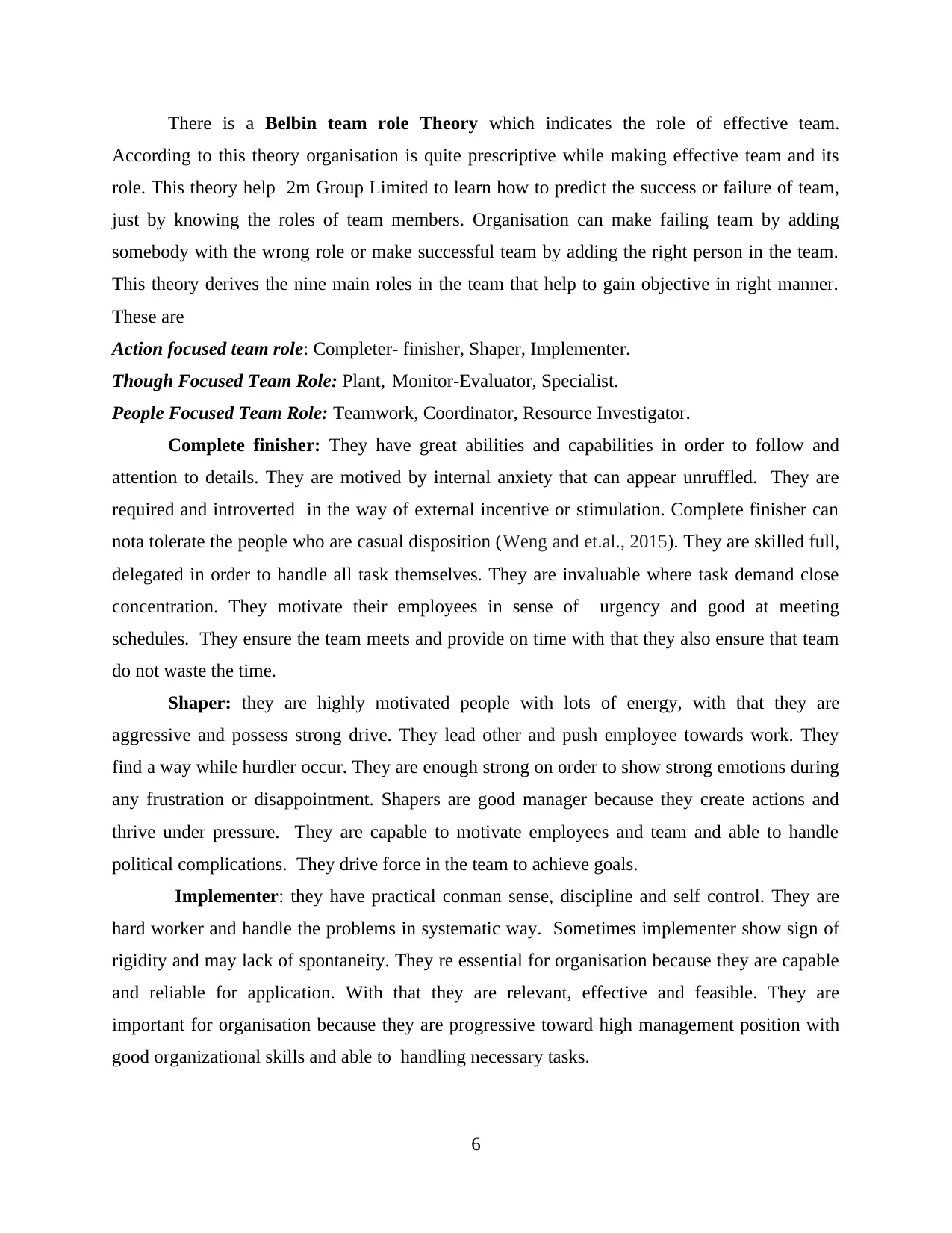
There is a Belbin team role Theory which indicates the role of effective team.
According to this theory organisation is quite prescriptive while making effective team and its
role. This theory help 2m Group Limited to learn how to predict the success or failure of team,
just by knowing the roles of team members. Organisation can make failing team by adding
somebody with the wrong role or make successful team by adding the right person in the team.
This theory derives the nine main roles in the team that help to gain objective in right manner.
These are
Action focused team role: Completer- finisher, Shaper, Implementer.
Though Focused Team Role: Plant, Monitor-Evaluator, Specialist.
People Focused Team Role: Teamwork, Coordinator, Resource Investigator.
Complete finisher: They have great abilities and capabilities in order to follow and
attention to details. They are motived by internal anxiety that can appear unruffled. They are
required and introverted in the way of external incentive or stimulation. Complete finisher can
nota tolerate the people who are casual disposition (Weng and et.al., 2015). They are skilled full,
delegated in order to handle all task themselves. They are invaluable where task demand close
concentration. They motivate their employees in sense of urgency and good at meeting
schedules. They ensure the team meets and provide on time with that they also ensure that team
do not waste the time.
Shaper: they are highly motivated people with lots of energy, with that they are
aggressive and possess strong drive. They lead other and push employee towards work. They
find a way while hurdler occur. They are enough strong on order to show strong emotions during
any frustration or disappointment. Shapers are good manager because they create actions and
thrive under pressure. They are capable to motivate employees and team and able to handle
political complications. They drive force in the team to achieve goals.
Implementer: they have practical conman sense, discipline and self control. They are
hard worker and handle the problems in systematic way. Sometimes implementer show sign of
rigidity and may lack of spontaneity. They re essential for organisation because they are capable
and reliable for application. With that they are relevant, effective and feasible. They are
important for organisation because they are progressive toward high management position with
good organizational skills and able to handling necessary tasks.
6
According to this theory organisation is quite prescriptive while making effective team and its
role. This theory help 2m Group Limited to learn how to predict the success or failure of team,
just by knowing the roles of team members. Organisation can make failing team by adding
somebody with the wrong role or make successful team by adding the right person in the team.
This theory derives the nine main roles in the team that help to gain objective in right manner.
These are
Action focused team role: Completer- finisher, Shaper, Implementer.
Though Focused Team Role: Plant, Monitor-Evaluator, Specialist.
People Focused Team Role: Teamwork, Coordinator, Resource Investigator.
Complete finisher: They have great abilities and capabilities in order to follow and
attention to details. They are motived by internal anxiety that can appear unruffled. They are
required and introverted in the way of external incentive or stimulation. Complete finisher can
nota tolerate the people who are casual disposition (Weng and et.al., 2015). They are skilled full,
delegated in order to handle all task themselves. They are invaluable where task demand close
concentration. They motivate their employees in sense of urgency and good at meeting
schedules. They ensure the team meets and provide on time with that they also ensure that team
do not waste the time.
Shaper: they are highly motivated people with lots of energy, with that they are
aggressive and possess strong drive. They lead other and push employee towards work. They
find a way while hurdler occur. They are enough strong on order to show strong emotions during
any frustration or disappointment. Shapers are good manager because they create actions and
thrive under pressure. They are capable to motivate employees and team and able to handle
political complications. They drive force in the team to achieve goals.
Implementer: they have practical conman sense, discipline and self control. They are
hard worker and handle the problems in systematic way. Sometimes implementer show sign of
rigidity and may lack of spontaneity. They re essential for organisation because they are capable
and reliable for application. With that they are relevant, effective and feasible. They are
important for organisation because they are progressive toward high management position with
good organizational skills and able to handling necessary tasks.
6
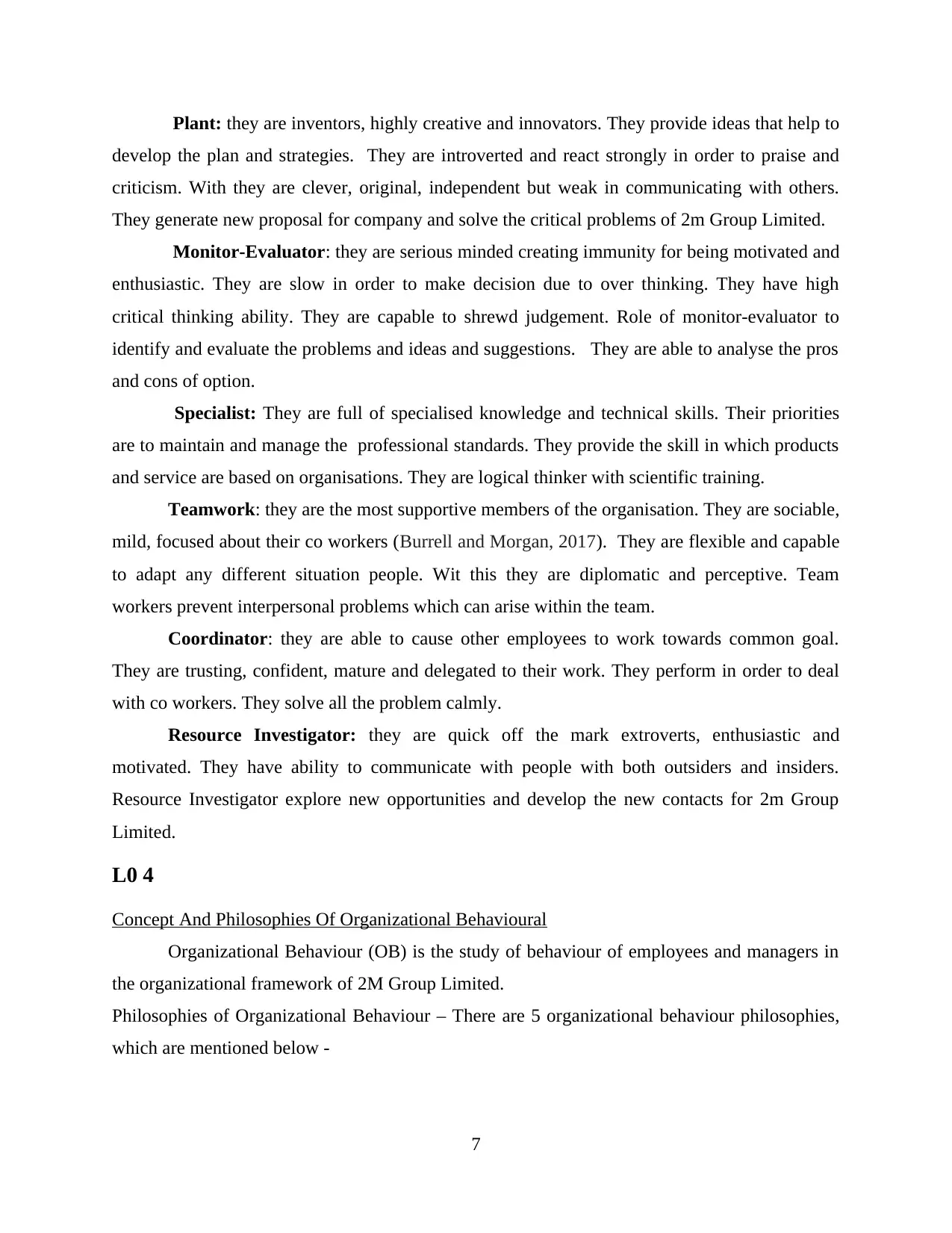
Plant: they are inventors, highly creative and innovators. They provide ideas that help to
develop the plan and strategies. They are introverted and react strongly in order to praise and
criticism. With they are clever, original, independent but weak in communicating with others.
They generate new proposal for company and solve the critical problems of 2m Group Limited.
Monitor-Evaluator: they are serious minded creating immunity for being motivated and
enthusiastic. They are slow in order to make decision due to over thinking. They have high
critical thinking ability. They are capable to shrewd judgement. Role of monitor-evaluator to
identify and evaluate the problems and ideas and suggestions. They are able to analyse the pros
and cons of option.
Specialist: They are full of specialised knowledge and technical skills. Their priorities
are to maintain and manage the professional standards. They provide the skill in which products
and service are based on organisations. They are logical thinker with scientific training.
Teamwork: they are the most supportive members of the organisation. They are sociable,
mild, focused about their co workers (Burrell and Morgan, 2017). They are flexible and capable
to adapt any different situation people. Wit this they are diplomatic and perceptive. Team
workers prevent interpersonal problems which can arise within the team.
Coordinator: they are able to cause other employees to work towards common goal.
They are trusting, confident, mature and delegated to their work. They perform in order to deal
with co workers. They solve all the problem calmly.
Resource Investigator: they are quick off the mark extroverts, enthusiastic and
motivated. They have ability to communicate with people with both outsiders and insiders.
Resource Investigator explore new opportunities and develop the new contacts for 2m Group
Limited.
L0 4
Concept And Philosophies Of Organizational Behavioural
Organizational Behaviour (OB) is the study of behaviour of employees and managers in
the organizational framework of 2M Group Limited.
Philosophies of Organizational Behaviour – There are 5 organizational behaviour philosophies,
which are mentioned below -
7
develop the plan and strategies. They are introverted and react strongly in order to praise and
criticism. With they are clever, original, independent but weak in communicating with others.
They generate new proposal for company and solve the critical problems of 2m Group Limited.
Monitor-Evaluator: they are serious minded creating immunity for being motivated and
enthusiastic. They are slow in order to make decision due to over thinking. They have high
critical thinking ability. They are capable to shrewd judgement. Role of monitor-evaluator to
identify and evaluate the problems and ideas and suggestions. They are able to analyse the pros
and cons of option.
Specialist: They are full of specialised knowledge and technical skills. Their priorities
are to maintain and manage the professional standards. They provide the skill in which products
and service are based on organisations. They are logical thinker with scientific training.
Teamwork: they are the most supportive members of the organisation. They are sociable,
mild, focused about their co workers (Burrell and Morgan, 2017). They are flexible and capable
to adapt any different situation people. Wit this they are diplomatic and perceptive. Team
workers prevent interpersonal problems which can arise within the team.
Coordinator: they are able to cause other employees to work towards common goal.
They are trusting, confident, mature and delegated to their work. They perform in order to deal
with co workers. They solve all the problem calmly.
Resource Investigator: they are quick off the mark extroverts, enthusiastic and
motivated. They have ability to communicate with people with both outsiders and insiders.
Resource Investigator explore new opportunities and develop the new contacts for 2m Group
Limited.
L0 4
Concept And Philosophies Of Organizational Behavioural
Organizational Behaviour (OB) is the study of behaviour of employees and managers in
the organizational framework of 2M Group Limited.
Philosophies of Organizational Behaviour – There are 5 organizational behaviour philosophies,
which are mentioned below -
7
⊘ This is a preview!⊘
Do you want full access?
Subscribe today to unlock all pages.

Trusted by 1+ million students worldwide
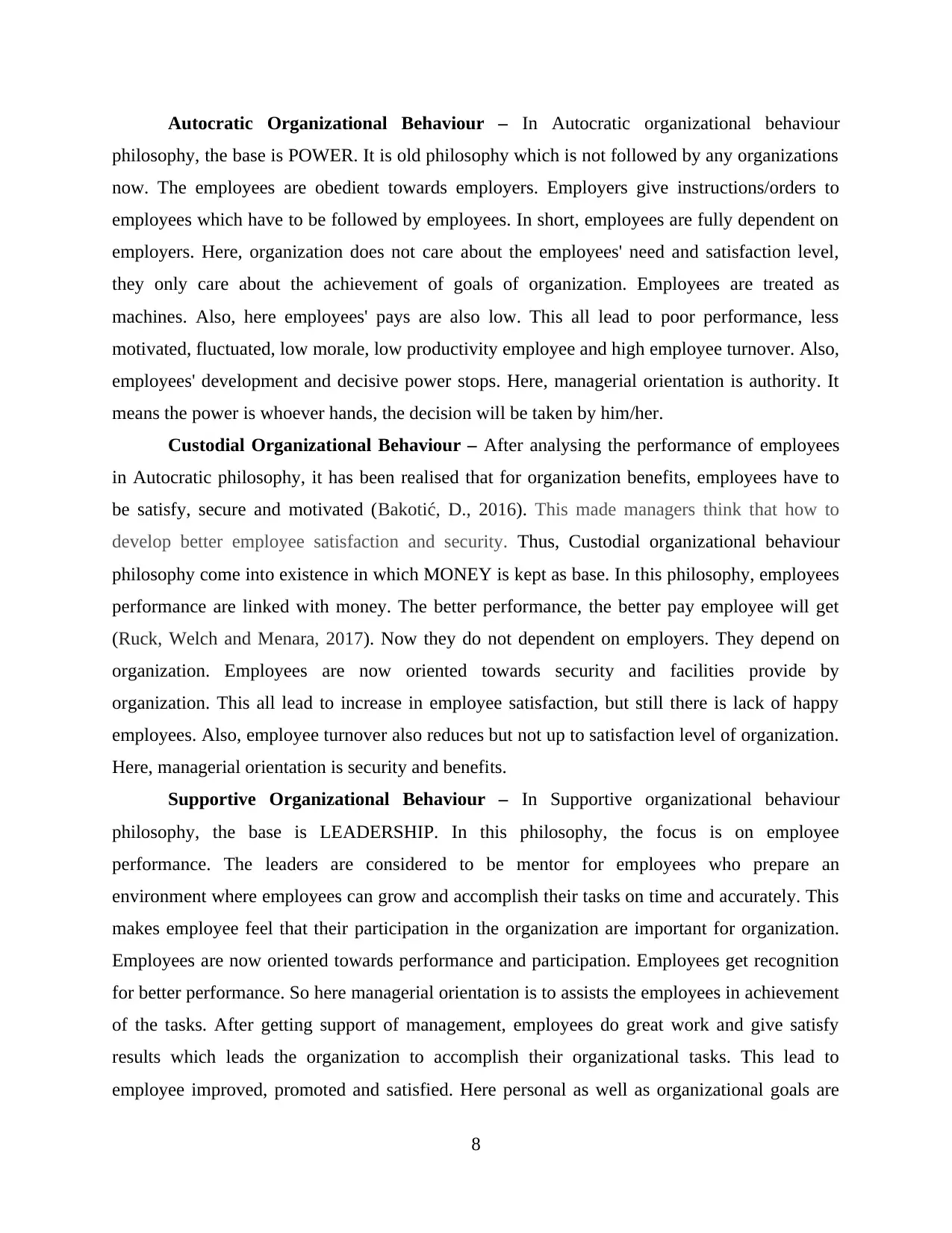
Autocratic Organizational Behaviour – In Autocratic organizational behaviour
philosophy, the base is POWER. It is old philosophy which is not followed by any organizations
now. The employees are obedient towards employers. Employers give instructions/orders to
employees which have to be followed by employees. In short, employees are fully dependent on
employers. Here, organization does not care about the employees' need and satisfaction level,
they only care about the achievement of goals of organization. Employees are treated as
machines. Also, here employees' pays are also low. This all lead to poor performance, less
motivated, fluctuated, low morale, low productivity employee and high employee turnover. Also,
employees' development and decisive power stops. Here, managerial orientation is authority. It
means the power is whoever hands, the decision will be taken by him/her.
Custodial Organizational Behaviour – After analysing the performance of employees
in Autocratic philosophy, it has been realised that for organization benefits, employees have to
be satisfy, secure and motivated (Bakotić, D., 2016). This made managers think that how to
develop better employee satisfaction and security. Thus, Custodial organizational behaviour
philosophy come into existence in which MONEY is kept as base. In this philosophy, employees
performance are linked with money. The better performance, the better pay employee will get
(Ruck, Welch and Menara, 2017). Now they do not dependent on employers. They depend on
organization. Employees are now oriented towards security and facilities provide by
organization. This all lead to increase in employee satisfaction, but still there is lack of happy
employees. Also, employee turnover also reduces but not up to satisfaction level of organization.
Here, managerial orientation is security and benefits.
Supportive Organizational Behaviour – In Supportive organizational behaviour
philosophy, the base is LEADERSHIP. In this philosophy, the focus is on employee
performance. The leaders are considered to be mentor for employees who prepare an
environment where employees can grow and accomplish their tasks on time and accurately. This
makes employee feel that their participation in the organization are important for organization.
Employees are now oriented towards performance and participation. Employees get recognition
for better performance. So here managerial orientation is to assists the employees in achievement
of the tasks. After getting support of management, employees do great work and give satisfy
results which leads the organization to accomplish their organizational tasks. This lead to
employee improved, promoted and satisfied. Here personal as well as organizational goals are
8
philosophy, the base is POWER. It is old philosophy which is not followed by any organizations
now. The employees are obedient towards employers. Employers give instructions/orders to
employees which have to be followed by employees. In short, employees are fully dependent on
employers. Here, organization does not care about the employees' need and satisfaction level,
they only care about the achievement of goals of organization. Employees are treated as
machines. Also, here employees' pays are also low. This all lead to poor performance, less
motivated, fluctuated, low morale, low productivity employee and high employee turnover. Also,
employees' development and decisive power stops. Here, managerial orientation is authority. It
means the power is whoever hands, the decision will be taken by him/her.
Custodial Organizational Behaviour – After analysing the performance of employees
in Autocratic philosophy, it has been realised that for organization benefits, employees have to
be satisfy, secure and motivated (Bakotić, D., 2016). This made managers think that how to
develop better employee satisfaction and security. Thus, Custodial organizational behaviour
philosophy come into existence in which MONEY is kept as base. In this philosophy, employees
performance are linked with money. The better performance, the better pay employee will get
(Ruck, Welch and Menara, 2017). Now they do not dependent on employers. They depend on
organization. Employees are now oriented towards security and facilities provide by
organization. This all lead to increase in employee satisfaction, but still there is lack of happy
employees. Also, employee turnover also reduces but not up to satisfaction level of organization.
Here, managerial orientation is security and benefits.
Supportive Organizational Behaviour – In Supportive organizational behaviour
philosophy, the base is LEADERSHIP. In this philosophy, the focus is on employee
performance. The leaders are considered to be mentor for employees who prepare an
environment where employees can grow and accomplish their tasks on time and accurately. This
makes employee feel that their participation in the organization are important for organization.
Employees are now oriented towards performance and participation. Employees get recognition
for better performance. So here managerial orientation is to assists the employees in achievement
of the tasks. After getting support of management, employees do great work and give satisfy
results which leads the organization to accomplish their organizational tasks. This lead to
employee improved, promoted and satisfied. Here personal as well as organizational goals are
8
Paraphrase This Document
Need a fresh take? Get an instant paraphrase of this document with our AI Paraphraser
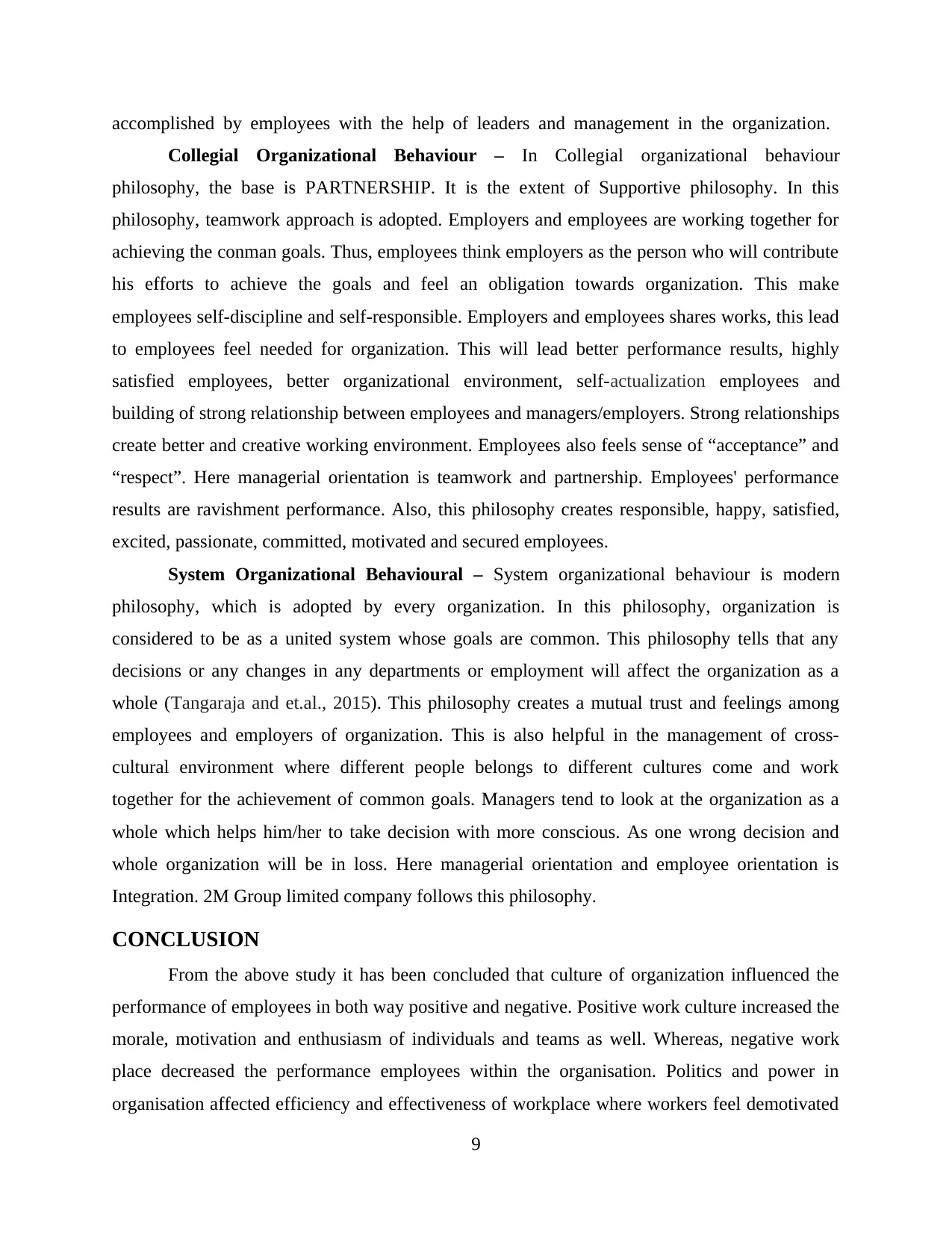
accomplished by employees with the help of leaders and management in the organization.
Collegial Organizational Behaviour – In Collegial organizational behaviour
philosophy, the base is PARTNERSHIP. It is the extent of Supportive philosophy. In this
philosophy, teamwork approach is adopted. Employers and employees are working together for
achieving the conman goals. Thus, employees think employers as the person who will contribute
his efforts to achieve the goals and feel an obligation towards organization. This make
employees self-discipline and self-responsible. Employers and employees shares works, this lead
to employees feel needed for organization. This will lead better performance results, highly
satisfied employees, better organizational environment, self-actualization employees and
building of strong relationship between employees and managers/employers. Strong relationships
create better and creative working environment. Employees also feels sense of “acceptance” and
“respect”. Here managerial orientation is teamwork and partnership. Employees' performance
results are ravishment performance. Also, this philosophy creates responsible, happy, satisfied,
excited, passionate, committed, motivated and secured employees.
System Organizational Behavioural – System organizational behaviour is modern
philosophy, which is adopted by every organization. In this philosophy, organization is
considered to be as a united system whose goals are common. This philosophy tells that any
decisions or any changes in any departments or employment will affect the organization as a
whole (Tangaraja and et.al., 2015). This philosophy creates a mutual trust and feelings among
employees and employers of organization. This is also helpful in the management of cross-
cultural environment where different people belongs to different cultures come and work
together for the achievement of common goals. Managers tend to look at the organization as a
whole which helps him/her to take decision with more conscious. As one wrong decision and
whole organization will be in loss. Here managerial orientation and employee orientation is
Integration. 2M Group limited company follows this philosophy.
CONCLUSION
From the above study it has been concluded that culture of organization influenced the
performance of employees in both way positive and negative. Positive work culture increased the
morale, motivation and enthusiasm of individuals and teams as well. Whereas, negative work
place decreased the performance employees within the organisation. Politics and power in
organisation affected efficiency and effectiveness of workplace where workers feel demotivated
9
Collegial Organizational Behaviour – In Collegial organizational behaviour
philosophy, the base is PARTNERSHIP. It is the extent of Supportive philosophy. In this
philosophy, teamwork approach is adopted. Employers and employees are working together for
achieving the conman goals. Thus, employees think employers as the person who will contribute
his efforts to achieve the goals and feel an obligation towards organization. This make
employees self-discipline and self-responsible. Employers and employees shares works, this lead
to employees feel needed for organization. This will lead better performance results, highly
satisfied employees, better organizational environment, self-actualization employees and
building of strong relationship between employees and managers/employers. Strong relationships
create better and creative working environment. Employees also feels sense of “acceptance” and
“respect”. Here managerial orientation is teamwork and partnership. Employees' performance
results are ravishment performance. Also, this philosophy creates responsible, happy, satisfied,
excited, passionate, committed, motivated and secured employees.
System Organizational Behavioural – System organizational behaviour is modern
philosophy, which is adopted by every organization. In this philosophy, organization is
considered to be as a united system whose goals are common. This philosophy tells that any
decisions or any changes in any departments or employment will affect the organization as a
whole (Tangaraja and et.al., 2015). This philosophy creates a mutual trust and feelings among
employees and employers of organization. This is also helpful in the management of cross-
cultural environment where different people belongs to different cultures come and work
together for the achievement of common goals. Managers tend to look at the organization as a
whole which helps him/her to take decision with more conscious. As one wrong decision and
whole organization will be in loss. Here managerial orientation and employee orientation is
Integration. 2M Group limited company follows this philosophy.
CONCLUSION
From the above study it has been concluded that culture of organization influenced the
performance of employees in both way positive and negative. Positive work culture increased the
morale, motivation and enthusiasm of individuals and teams as well. Whereas, negative work
place decreased the performance employees within the organisation. Politics and power in
organisation affected efficiency and effectiveness of workplace where workers feel demotivated
9
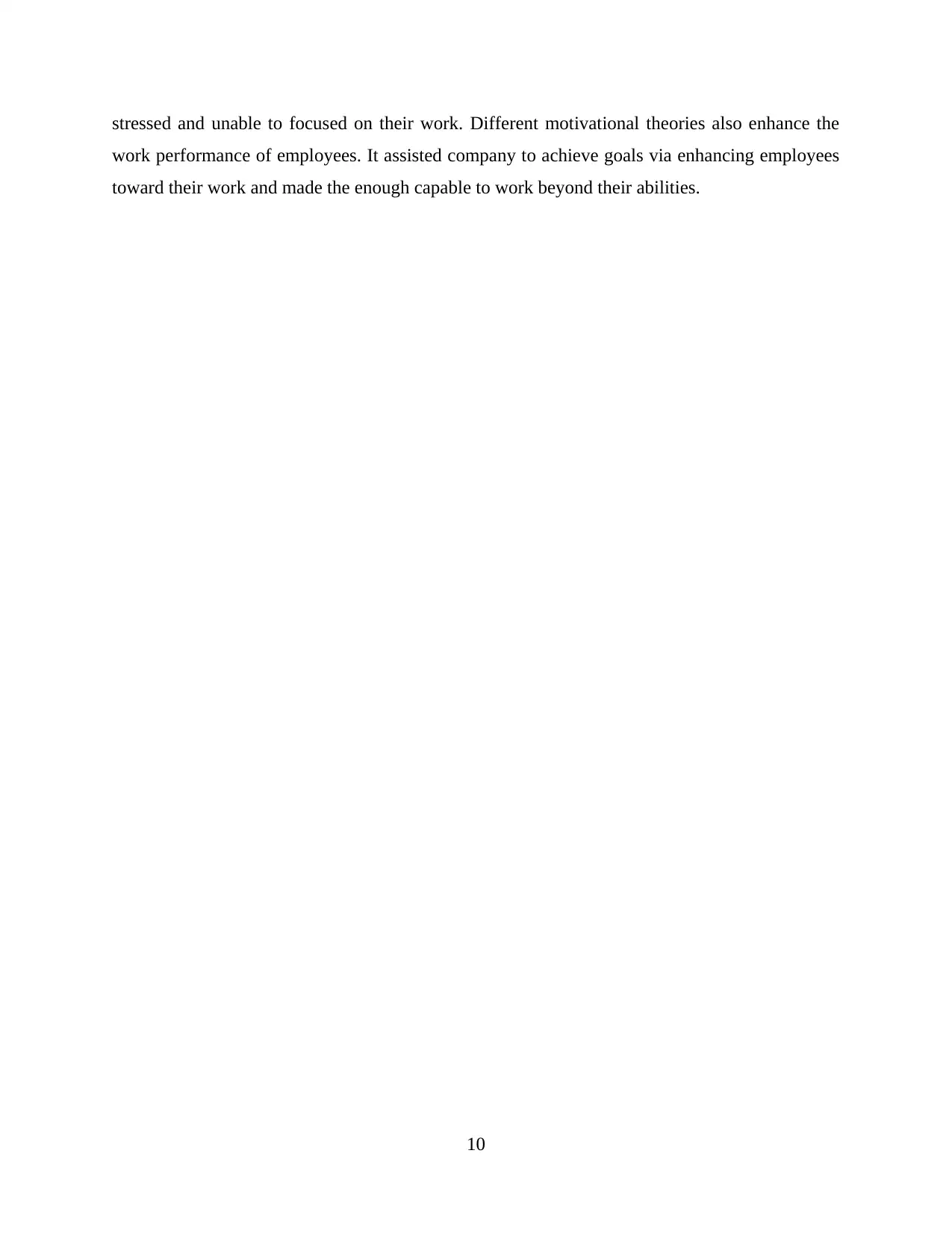
stressed and unable to focused on their work. Different motivational theories also enhance the
work performance of employees. It assisted company to achieve goals via enhancing employees
toward their work and made the enough capable to work beyond their abilities.
10
work performance of employees. It assisted company to achieve goals via enhancing employees
toward their work and made the enough capable to work beyond their abilities.
10
⊘ This is a preview!⊘
Do you want full access?
Subscribe today to unlock all pages.

Trusted by 1+ million students worldwide
1 out of 14
Related Documents
Your All-in-One AI-Powered Toolkit for Academic Success.
+13062052269
info@desklib.com
Available 24*7 on WhatsApp / Email
![[object Object]](/_next/static/media/star-bottom.7253800d.svg)
Unlock your academic potential
Copyright © 2020–2026 A2Z Services. All Rights Reserved. Developed and managed by ZUCOL.





